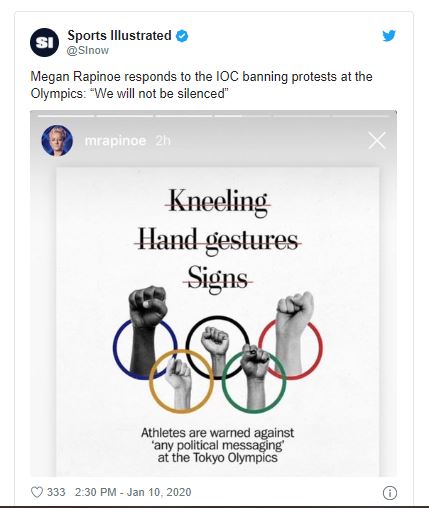 Some of the most vociferous voices in support of athlete protest are crying foul over the International Olympic Committee's (IOC) recent policy announcement preventing inappropriate political activism at the 2020 Summer Games in Tokyo. U.S. women's soccer star Megan Rapinoe says she won't be silenced, and USA Today is bitterly denouncing the IOC's stance.
Some of the most vociferous voices in support of athlete protest are crying foul over the International Olympic Committee's (IOC) recent policy announcement preventing inappropriate political activism at the 2020 Summer Games in Tokyo. U.S. women's soccer star Megan Rapinoe says she won't be silenced, and USA Today is bitterly denouncing the IOC's stance.
On Thursday, the IOC banned protests by athletes who are on the field of play, in the Olympic Village and during medal and other official ceremonies.
Rapinoe defiantly responded via Instagram that she will not be silenced: "So much being done about the protests. So little being done about what we are protesting about. We will not be silenced."
Rapinoe earned notoriety in 2016 when she copied Colin Kaepernick's protests of the national anthem, and last year she started a feud with President Donald Trump, saying her protests are a "big F-you" to his policies. While receiving awards and appearing in victory parades and interviews, she's been mouthing off for months about LGBT rights, racism in soccer, and pay equality without any opposition. The IOC just provided some restraint, and Rapinoe can't handle it.
A staunch defender of athlete protests, USA Today writer Nancy Armour is also angry about the IOC's attempt to head off protests that would taint the upcoming Olympics. She is "awarding" the Gold medal for hypocrisy to the IOC:
"If you’re imagining this being said with a condescending tone of 'Do as I say, not as I do,' you are not alone. IOC leaders, president Thomas Bach in particular, have crossed that supposed bright line separating the Olympics from politics so often that it’s no longer visible.
"There is the IOC’s observer status with the United Nations General Assembly, which it has had for the last decade. Since 2017, the IOC and UN have had a 'direct partnership,' which gives the UN 'direct access to the expertise and know-how of the IOC and its 206 National Olympic Committees, as well as the International Sports Federations.' So much so that the UN decided it no longer needed its own group that used sports to promote peace initiatives."
Armour also castigates the IOC because it frequently hobnobs with national leaders, allegedly kowtows to Russia and has tried to smooth relations between North and South Korea.
It's "[a] noble cause, to be sure," to try and promote peace in Korea, Armour writes, "But as intertwined in politics as you can possibly be. The truth is, it’s not the mixing of politics and sports that Bach and the IOC don’t like. It’s the mixing of politics they don’t like with sports."
None of the IOC's actions occur on Olympic venues or on victory stands, which are purposed for athletic competition and celebrations of success — not for bitter Kaepernick-esque downers.
Armour prefers her sports with a heavy dose of activism, not the protest-lite version the IOC is demanding. "But God forbid athletes should stay silent about racism, homophobia, inequality or murderous regimes. You know, issues that have a direct effect on their lives."
A Trump-hater, Armour wants athletes with strong opinions about the president to have a free reign on protest in Tokyo. She also prefers the spirit of protest to register as loudly as the spirit of the Games:
"But the IOC cannot proudly celebrate the individual spirit of athletes – higher, faster, stronger – while at the same time demanding a large part of it be buried or ignored."
...
"The irony is that the athletes that sports leaders have tried to silence in the moment are often considered towering examples of righteousness, and beloved because of it, once history catches up."
Armour complains that the Olympics is not a "magical fairyland where problems don’t exist and there is universal harmony. There is an Olympic refugee team because of war and corrupt politicians. The heartwarming stories of athletes who have overcome tough circumstances are often rooted in poverty and discrimination."
Instead of crushing the spirit of protest, Armour writes, the leaders of the IOC should respect the athletes' ways of making the world a better place. In other words, when athletes kneel, raise a fist or mouth off about radical progressive politics, they're making the world a better place. Not just crusading for their own selfish personal and political demands.






